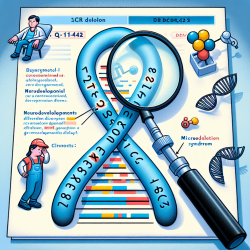In the field of speech-language pathology, creating great outcomes for children is a shared passion. Practitioners are often on the lookout for data-driven insights that can help them refine their approach. One such valuable resource is the research article titled Autism Spectrum Disorder in Down Syndrome: Experiences from Caregivers. This study delves into the unique challenges and experiences of families raising children with both Down Syndrome (DS) and Autism Spectrum Disorder (ASD). By implementing the findings from this research, practitioners can significantly improve their skills and outcomes for this unique population.
Key Findings from the Research
The study surveyed caregivers of children with DS-ASD to understand their journey from early concerns to diagnosis and intervention. Several critical themes emerged:
- Delayed Diagnosis: On average, there was a 4.65-year gap between caregivers noticing symptoms and receiving an ASD diagnosis. This delay often led to missed opportunities for early intervention.
- Common Initial Concerns: Caregivers frequently reported stereotypic behaviors, severe communication impairments, and behavioral difficulties as initial signs prompting further evaluation.
- Frustration and Isolation: Many caregivers expressed frustration with the diagnostic process and described high levels of stress and social isolation.
- Beneficial Interventions: Behavioral and communication support were identified as particularly beneficial therapeutic interventions.
Implementing Research Outcomes
Practitioners can leverage these insights to enhance their practice in several ways:
- Early Identification: By being vigilant about the early signs of ASD in children with DS, practitioners can facilitate earlier diagnoses and interventions. Understanding that a mean 4.65-year delay exists highlights the need for proactive screening.
- Tailored Interventions: Given the unique challenges faced by children with DS-ASD, interventions should be customized. Behavioral and communication supports have shown to be effective, and practitioners should consider incorporating these into their therapeutic strategies.
- Parental Support: Acknowledging the high levels of stress and social isolation reported by caregivers, practitioners should provide resources and support groups to help families navigate the complexities of raising a child with DS-ASD.
- Continuous Education: As the study highlights a lack of awareness among primary care providers, ongoing education and training about DS-ASD are crucial. This ensures that all professionals involved in a child's care are equipped with the necessary knowledge.
Encouraging Further Research
While this study provides valuable insights, it also underscores the need for further research. Understanding the nuanced experiences of families and the effectiveness of different interventions can lead to better tailored care models. Practitioners are encouraged to contribute to and stay updated with ongoing research in this field.
To read the original research paper, please follow this link: Autism Spectrum Disorder in Down Syndrome: Experiences from Caregivers.










